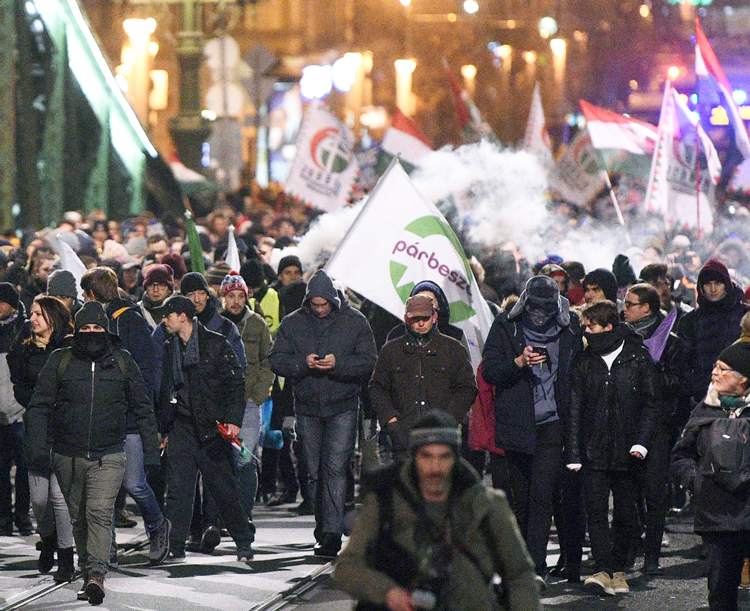Up to 15,000 people took to the streets of Budapest, Hungary, Dec. 16, capping four days of protests against recent anti-working-class government measures. The protests targeted a law passed a few days earlier that authorizes bosses to force more overtime from workers. The protest was organized by trade unions, students and some opposition parties. Similar actions took place in seven other cities around the country.
The measures adopted by the government of Prime Minister Viktor Orban give bosses the power to increase the number of mandatory overtime hours from 250 to 400 a year, and companies will have up to three years to pay workers for these hours. Bosses there confront a labor shortage, with a government that refuses to allow increased immigration. Facing lower wages and worse working conditions, some 600,000 of the country’s 9.8 million people have left to seek work abroad.
To counter pressure on workers to work overtime, the Hungarian Trade Union Confederation is demanding a double-digit increase in the minimum wage. The federation organized a protest days before the new law was adopted, with its members wearing yellow vests, emulating protesters across France who forced President Emmanuel Macron to raise the minimum wage for some and retreat on proposed fuel tax hikes.
Among the beneficiaries of the new forced overtime laws will be bosses at auto plants in Hungary, which account for nearly a third of all industrial output. To take advantage of conditions that yield higher profits, German car manufacturers Audi and Daimler have set up factories in Hungary. BMW announced it would build a new plant there in July. “We work for German automotive companies for low pay, and they sell their cars for the same price [as elsewhere in Europe],” retired factory worker Antonia Raday told Al Jazeera. “Either they should pay us more or lower their prices.”
Some 2,000 protesters rallied outside the state media’s headquarters during the Dec. 16 action in Budapest, chanting “factory of lies!” They were dispersed by cops firing tear gas. Some demonstrators also voiced opposition to a new court “justice” system to be controlled by the government’s justice minister. He will oversee newly created courts to rule over the legality of strikes and protests, and to regulate the cops and electoral laws.
The new overtime laws come in the wake of other government assaults on working people. Orban in October “abolished” homelessness — by banning people from sleeping on the streets. Within days of the law’s passage, cops began arresting some of the country’s estimated 30,000 homeless people.
Orban gov’t built on anti-EU anger
Orban was re-elected prime minister in April, campaigning against EU pressures by the richer capitalist rulers in Berlin and Paris against smaller, weaker countries like Hungary. Protests have grown as he’s used his power to strengthen the bosses’ advantage over working people.
Orban continues to clash with capitalist rivals in Europe. He campaigned against refugee quotas proposed by the European Union, winning the support of anti-immigrant governments in the Czech Republic, Romania and Slovakia.
EU bureaucrats do little to hide their scorn for Orban. The EU parliament launched a disciplinary probe against Orban’s administration in September. It adopted a report by Dutch Green Member of the European Parliament Judith Sargentini indicting the Hungarian government for the “crime” of a “breach of the values of our union.”


